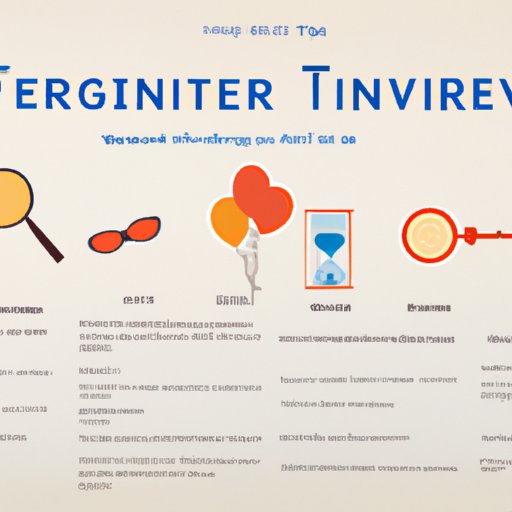Introduction
In vitro fertilization (IVF) is a medical procedure used to help couples conceive a child when other fertility treatments have failed. It involves retrieving eggs from the mother’s ovaries and fertilizing them with sperm in a laboratory setting. The resulting embryos are then transferred back into the mother’s uterus, where one or more can potentially develop into a healthy pregnancy.
This article will provide a comprehensive guide to the IVF process from start to finish. We will explore the different phases of treatment, discuss what to expect during the IVF journey, and look at how long it takes to complete an IVF cycle.
A Step-by-Step Guide to the IVF Process
The IVF process typically starts with an initial consultation with a fertility specialist. During this appointment, the doctor will review your medical history and run tests to assess your overall health and reproductive system. In some cases, additional tests may be necessary to determine the cause of infertility or to rule out potential medical issues.
Once the initial consultation is complete, fertility testing may be done to evaluate the quality of both the male and female partner’s gametes (sperm and eggs). This testing can include semen analysis, hormone testing, imaging tests, and/or genetic testing. Depending on the results of these tests, the doctor may recommend further treatment such as ovarian stimulation, which involves taking hormones to stimulate the ovaries to produce multiple eggs.
Once the eggs have matured, they are retrieved via a minor surgical procedure called egg retrieval. During this procedure, a doctor will use a needle to extract the eggs from the follicles in the ovaries. The retrieved eggs are then mixed with sperm in a lab setting to create embryos.
After a few days of development, one or more embryos are transferred back into the mother’s uterus using a catheter. This procedure is known as embryo transfer. After the transfer, the mother will need to wait for a few weeks to see if the embryo implants and develops into a healthy pregnancy.
Additional tests may be performed to monitor the progress of the pregnancy, such as blood tests and ultrasounds. If the pregnancy test is positive, the mother can expect to continue monitoring her pregnancy until delivery.

Exploring the Length of Time for IVF Treatment
When considering the length of time for IVF treatment, it is important to understand that every patient is unique and the timeline for each case may vary. Generally speaking, however, the average IVF cycle typically lasts about three to four months from start to finish.
The timeline of an IVF cycle can be broken down into several stages: initial consultation, fertility testing, ovarian stimulation, egg retrieval, embryo transfer, and post-transfer monitoring. Each stage can take anywhere from a few days to several weeks to complete, depending on the individual case.
The length of time between each stage of the IVF process can also depend on several factors, such as the patient’s age, the severity of the infertility issue, and the availability of resources. For example, if the patient is older or has a complicated medical history, the fertility testing and ovarian stimulation phases may take longer than usual.
How Long Does it Take to Complete an IVF Cycle?
The timeline for an IVF cycle can vary greatly from patient to patient, but generally speaking, it typically takes about three to four months from start to finish. The initial consultation usually takes place within a few days, while fertility testing and ovarian stimulation can take several weeks to complete. Egg retrieval is typically done within a day or two, and embryo transfer is usually done within a week of the egg retrieval.
After the embryo transfer, patients usually have to wait a few weeks to find out if the embryo has implanted and developed into a healthy pregnancy. If the pregnancy test is positive, the mother will need to continue monitoring her pregnancy until delivery. This can take anywhere from nine to ten months, depending on the individual case.

What to Expect During the IVF Journey
IVF treatment can be an emotional and challenging journey. It is important to be prepared for the various stages of treatment and to be aware of the potential risks and complications associated with the procedure. Here is a brief overview of what you can expect during the IVF process:
Pre-Treatment Planning: Before starting the IVF process, it is important to meet with a fertility specialist to discuss your medical history and any potential risks or complications associated with the procedure. You should also discuss your expectations and goals for the treatment and come up with a plan for moving forward.
Monitoring and Treatment: During the IVF process, you may need to undergo regular monitoring and testing to evaluate the progress of the treatment. This could include blood tests, ultrasounds, and other tests to check for any potential problems or complications. You may also need to take medications, such as hormones, to stimulate the ovaries or prepare the uterus for implantation.
Post-Treatment Care: After the embryo transfer, you will need to wait a few weeks to find out if the embryo has implanted and developed into a healthy pregnancy. During this time, it is important to follow your doctor’s instructions and take any prescribed medications to support the pregnancy. In some cases, additional tests may be necessary to monitor the progress of the pregnancy.
A Comprehensive Look at the IVF Process
It is important to understand the different phases of the IVF process in order to be fully prepared for the journey ahead. Here is a comprehensive look at the IVF process from start to finish:
Initial Consultation: The first step of the IVF process is to meet with a fertility specialist to discuss your medical history and review any potential risks or complications associated with the procedure. The doctor will also run tests to assess your overall health and reproductive system.
Fertility Testing: After the initial consultation, fertility testing may be done to evaluate the quality of both the male and female partner’s gametes (sperm and eggs). This testing can include semen analysis, hormone testing, imaging tests, and/or genetic testing.
Ovarian Stimulation: Depending on the results of the fertility tests, the doctor may recommend further treatment such as ovarian stimulation, which involves taking hormones to stimulate the ovaries to produce multiple eggs.
Egg Retrieval: Once the eggs have matured, they are retrieved via a minor surgical procedure called egg retrieval. During this procedure, a doctor will use a needle to extract the eggs from the follicles in the ovaries.
Embryo Transfer: The retrieved eggs are then mixed with sperm in a lab setting to create embryos. After a few days of development, one or more embryos are transferred back into the mother’s uterus using a catheter.
Further Testing: Additional tests may be performed to monitor the progress of the pregnancy, such as blood tests and ultrasounds. If the pregnancy test is positive, the mother can expect to continue monitoring her pregnancy until delivery.
Conclusion
IVF is a complex and often lengthy process, but it can be a successful way for couples to conceive a child when other fertility treatments have failed. With proper planning and preparation, understanding the different phases of treatment, and being aware of the potential risks and complications associated with the procedure, couples can better navigate the IVF journey.
This article provided a comprehensive guide to the IVF process from start to finish, exploring the different phases of treatment, discussing what to expect during the IVF journey, and looking at how long it takes to complete an IVF cycle. We hope this information will help couples make informed decisions about their fertility treatment options.
(Note: Is this article not meeting your expectations? Do you have knowledge or insights to share? Unlock new opportunities and expand your reach by joining our authors team. Click Registration to join us and share your expertise with our readers.)
